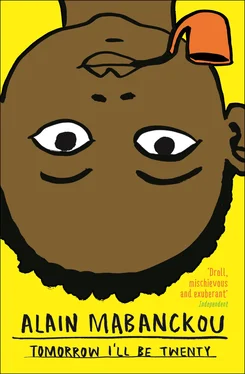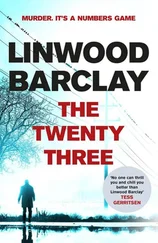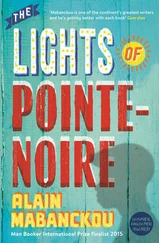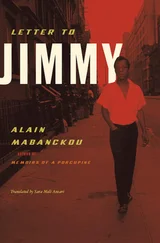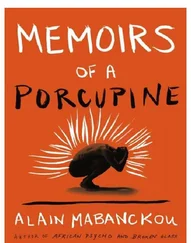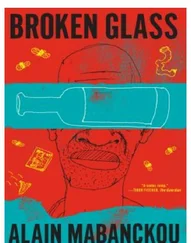Uncle René’s coming to see us today because it’s Saint Michel’s Day. I don’t actually know who this Saint Michel is, and I always wonder why my uncle chose to call me Michel. If Michel’s a saint, it must be a story in the Bible somewhere, that’s where you find all the saints and other people connected to God. On the other hand, when I look on the calendar it says Saint Michel’s Day is the twenty-ninth September, which is the day and month I was born. So Uncle René must have looked at the calendar before he said to my mother, ‘Let’s keep it simple, I’ll look at the calendar and just give him the name of the saint’s day he was born on.’
So this year on the twenty-ninth September, as usual, my uncle brought me a plastic lorry, a little spade and a little rake, so I can play at farming. He says if ever there’s a real revolution in our country, it will come from the farming community, from the peasants, the people who love the land. That’s who the communists are fighting for, not for the people sitting in offices exploiting their fellow men. You need to get children into good habits so they’ll love farming, which man has been doing since the world began.
We listen to my uncle talking about farming and telling us what Karl Marx and Engels think about it. Afterwards, he looks over at Maman Pauline. ‘Engels was right and I agree with him: until now philosophers have only interpreted the world, now it must be changed…’
I repeat what he’s just said to myself, inside my head, because I like the sound of it and my uncle says it shaking his fist like he wants to get into a fight with the enemies of Revolution. He can tell my mother and I don’t understand what he’s saying, so he leaves the house, goes out to his car and comes back two minutes later with a little book which he hands to me, even though my mother was the one he was quoting communists at.
‘Here, have this, Michel. Everything I’ve been telling you is in this book. There’s more in this book than in the bible, these are scientific truths, not just opium for fooling the masses.’
I take the book, and read the title, which begins with a difficult word to pronounce: Ludwig Feuerbach and the End of Classical German Philosophy . The guy who wrote it is called Friedrich Engels. Yes, I’ve seen his photo, at my uncle’s house. Now I know that Engels’ first name is Friedrich. Uncle René has always said ‘Engels’, never ‘Friedrich Engels’.
There’s isn’t a picture of Friedrich Engels on the back of this book. I would have liked to compare it with the one at my uncle’s house. Perhaps when someone’s famous they stop putting their photo on the back of the books they write, and if they do put someone’s photo on the back of the book it’s to get them known, because no one has heard of them yet. Is Engels more famous than our President? I think he must be, and that’s why on the book our President wrote there’s a big photo of him, smiling.
I open the book by Engels just to see if there are any photos in it. There aren’t, there are only words, in really small type, as if they didn’t want us children to be able to read what it says.
‘Michel, don’t read it! You’re still too young to understand. Even my comrades on the People’s Neighbourhood Committee find it hard. Engels was a true visionary! The world has to change, and the change can only come about through farming; the peasants must own their means of production, we must put an end to capitalist profit, and set up a true proletariat dictatorship! And how can this be done? I’ll tell you: we must re-read history, as Marx tells us, in the light of historical materialism or more correctly, new materialism, because in fact, though the popular masses — supposedly the beneficiaries of Marxist thought — don’t like to hear it, Marx never talked about historical materialism, but about new materialism! It’s a crucial distinction, and I might even say, a fundamental one. Do you follow?’
We nod our heads, though we still don’t understand. He takes this as encouragement, and he goes on, ‘It’s blindingly obvious: all social relationships are of necessity founded on confrontation, textually speaking you might almost say on the class struggle. Our relationships are based on our everyday experience and not on ideology, I mean, the superstructure, since we now know that ideology will never change the world for us in the sense that it changes our living conditions, or our social relationships, etc. Marx is quite clear about that, he set it down in black and white, and I quote: The new materialism sees things from the perspective of human society, or social humanity , unquote.’
Talking about Engels, Lenin and Karl Marx, and the immortal Marien Ngouabi makes him sweat heavily. He takes a handkerchief from his pocket and wipes his brow. He’s just realised that in fact we haven’t understood a word he’s been saying and once more he turns to my mother. ‘Well, I’ll leave it there. I get the feeling I’m preaching in the Sahara desert. You come with me, we need to sort out a few things. But not in front of the boy.’
They leave the house and go and talk out in the yard. But they talk too loud, and I hear everything. Yet again, it’s about the inheritance of my grandmother Henrietta Ntsoko’s land. She was married to my grandfather, Grégoire Moukila, the chief of Louboulou village. My grandfather had land, chickens, sheep, goats, pigs, cattle, manioc fields and maize. He left it all to my grandmother. Now she’s dead, Uncle René claims everything’s his, because he’s the older brother and my mother will have to wait till he dies to recover my grandmother’s inheritance, along with Uncle René’s.
Maman Pauline disagrees.
‘René, this is family, not your politics that come from books by Angèle.’
‘Engels!’
‘Whoever! This is about our family. Why are you telling me these lies? You’ve already taken our brother’s house, when it should be his children who get it!’
‘Are you kidding? Why should his children get the house?’
‘Because children should be the ones who inherit!’
‘Oh no, that’s a typical capitalist point of view. You see — we’re still all under the sway of imperialism! We need to get back to our own traditions, get back in touch with ourselves. This house belonged to my brother and it’s my job to look after it because I was the one who paid for his medicines when he was in hospital. And don’t forget, I bought Albert’s coffin and fed the people who came to his wake! What did Albert’s children actually do for him while he was ill at the Adolphe-Cissy Hospital?’
The deceased brother they’re talking about was my grandfather’s oldest child, and worked for the electricity company in Pointe-Noire. He died when I was very small. Now I realise the beautiful house where Uncle René and his wife and children live is in fact Uncle Albert Moukila’s house. My mother sometimes talks to me about his children, who I’ve never met. Some of them, apart from the older sister, Albertine, have names that make me giggle. The cousin they call ‘Abeille’ comes after Albertine and has studied in the USSR. Then there’s ‘Pretty Boy’ Firmin, who has a little amateur band in the Rex quartier . Then there’s Gorgeous Djoudjou, who’s finishing his studies in France. Finally, there are the twins, Gilbert ‘the Magician’ and Nzoussi ‘Miss Picky’, who call my mother ‘Papa Pauline’. Uncle René threw them all out of their father’s house and took the inheritance for himself, as if he’d earned all this wealth through hard work.
‘This time I’m not going to let you take all our mother’s things,’ Maman Pauline continues.
‘You only have to wait till I die, then you’ll get everything that’s mine, mother’s things and the house I inherited from Albert.’
Читать дальше
